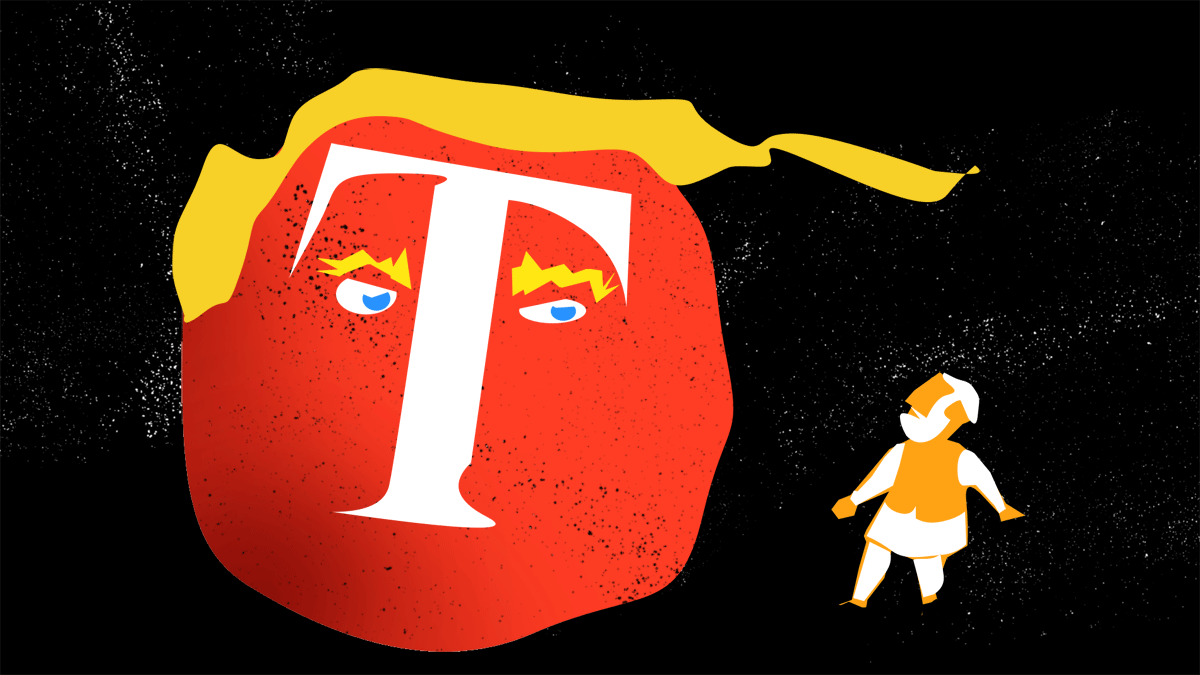India will take all necessary steps to safeguard and promote national interest, Commerce and Industry Minister Piyush Goyal said on Thursday, a day after US President Donald Trump announced 25 per cent tariffs plus penalty on domestic exports to America from August 1.

Illustration: Dominic Xavier/Rediff
In a suo motu statement in both the houses of Parliament, he said, the government is examining the implications of these tariffs and is in consultation with all stakeholders, including farmers, exporters, MSMEs and industry bodies, on the tariffs.
“The Government attaches the utmost importance to protecting and promoting the welfare of our farmers, workers, entrepreneurs, exporters, MSMEs and all sections of industry.
“We will take all necessary steps to secure and advance our national interest,” he said.
He added that the implications of the recent development are being examined by the government.
The ministry is engaged with all stakeholders including exporters and industry for taking feedback of their assessment of the situation, Goyal said.
US President Donald Trump on Wednesday announced the imposition of a 25 per cent tariff on all goods coming from India starting August 1, plus an unspecified penalty for buying Russian crude oil and military equipment.
The surprise announcement came amid a US trade team visiting India from August 25 for the sixth round of negotiations for the proposed bilateral trade agreement.
Goyal’s remarks are important as India has hardened its stance on giving duty concessions to the US on agriculture and dairy sectors — a key demand of America in the trade talks with India.
India is seeking import duty concessions from the US for its labour-intensive sectors like gems & jewellery and others, besides auto parts.
The two countries are negotiating a bilateral trade agreement (BTA) from March with an aim to more than double the bilateral trade in goods and services to $500 billion by 2030 from the current $191 billion.
So far five rounds of talks have been completed.
For the sixth round of talks, the US team is visiting India from August 25.
They are aiming to conclude the first phase of the agreement by fall (October-November) this year.
The two sides are also looking at an interim trade deal before the BTA.
India and the US entered into negotiations for a fair, balanced and beneficial bilateral trade agreement in March 2025, with the first phase of the agreement to be completed by fall of 2025, he said.
The minister also said that in just over a decade, India has rapidly transformed from being one of the Fragile 5 to the fastest growing major economy in the world.
“We have risen from the 11th largest economy to one of the top 5 economies, driven by our reforms, hard work of our farmers, MSMEs and entrepreneurs.
“It is also widely expected that we will become the 3rd largest economy in a few years,” Goyal said.
Today, he said, international institutions and economists see India as the bright spot in the global economy.
India is contributing to almost 16 per cent of global growth, he said.
Trump once again mounted a sharp attack on India and Russia for their close ties and said he doesn’t care what New India does with Moscow.
“I don’t care what India does with Russia.
“They can take their dead economies down together, for all I care,” he said.
“We have done very little business with India, their tariffs are too high, among the highest in the World,” he added.
Goyal said that in the last decade, the government has taken measures to promote India as the manufacturing hub of the world, driven by the Make in India initiative.
“India’s young, skilled and talented workforce is driving innovation and competitiveness of Indian industry.
“Our exports have steadily increased during the last 11 years,” he said, adding in an increasingly protectionist world, India has done mutually beneficial trade agreements with UAE, UK, Australia and EFTA countries.
“We are also committed to similar trade agreements with other countries.
“We are consistently working for the welfare of the farmers and Indian agriculture, to promote prosperity and ensure food security,” the minister noted.



